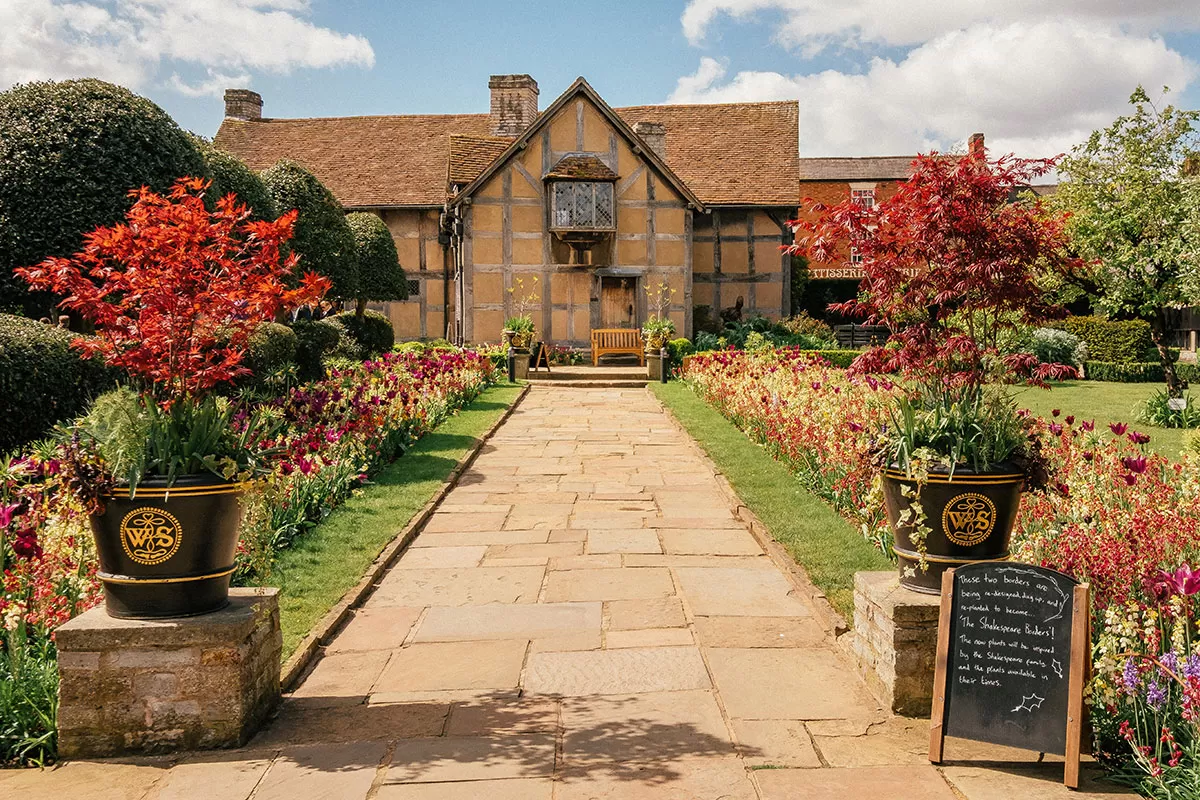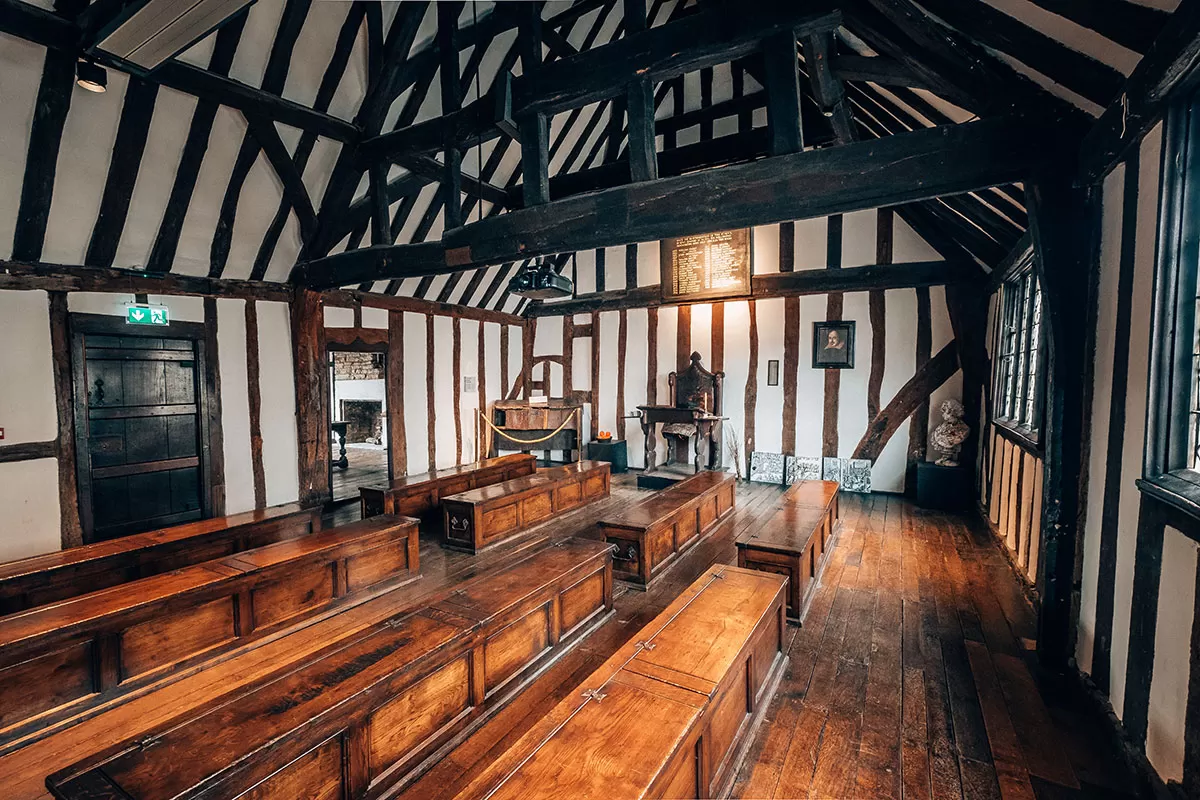You are a poet and you didn’t even know it! From ‘Love is blind’ to ‘Break the ice’, here are 25 common words and phrases Shakespeare invented that we use every day.
What words did Shakespeare invent? Plenty! Many of which you use every day without even realising. Languages fascinate me, especially etymology. In his 20 year career, Shakespeare wrote close to 1 million words, 17,677 different words, and 1,705 new words. Many of which we still use today.
Leading on from my previous post on Italian expressions, I started thinking about the influence writers have on the development of languages.

Shakespeare’s birthplace in Stratford-upon-Avon
Take Dante Alighieri for example. Born in Florence, Italy around 1265 Dante wrote The Divine Comedy (La Divina Commedia) which is widely considered to be the greatest literary work composed in Italian and a masterpiece of world literature. Why was Dante so special you ask? Well, the result of his work basically established the national language of Italy, Italiano! Impressive, right?
Back in the Middle Ages, the majority of poetry was inaccessible to the lower classes as it was written in Latin and therefore only affluent and educated people could understand it. Dante defended the everyday use of vernacular and used it in his literature. He even wrote the Divine Comedy using his Tuscan dialect. For the times, this approach was highly unorthodox, yet it set the wheels in motion for other writers to follow suit. Even William Shakespeare was inspired by Dante’s depiction of Hell, Purgatory, and Heaven.
While you may not have heard of Dante Alighieri, Shakespeare is definitely a household name. Either you studied him in high school and learned a verse from one of his plays, or came across his work while study English as a foreign language.
Shakespeare’s Influence
 Shakespeare is also known as The Bard. A ‘bard’ was a travelling poet in medieval times who made a living performing and telling stories. Born in 1564 in Stratford-upon-Avon, England, Shakespeare had a significant impact on the English language. His career lasted only 20 years, yet he wrote 37 plays and 154 sonnets.
Shakespeare is also known as The Bard. A ‘bard’ was a travelling poet in medieval times who made a living performing and telling stories. Born in 1564 in Stratford-upon-Avon, England, Shakespeare had a significant impact on the English language. His career lasted only 20 years, yet he wrote 37 plays and 154 sonnets.
Part of Shakespeare’s genius was the fact that his work appealed to everyone, ranging from kings to peasants. He helped shape modern English in a time where grammar, spelling and pronunciation were less standardised than they are now. Today, more than 400 years later his plays are still being read and performed all over the world.

Shakespeare’s classroom in Stratford-uopn-Avon
What you may not know is that many phrases, expressions, and proverbs that we use today either originated with or were popularised by their use in Shakespeare’s work. While it’s unclear whether these phrases were already in existence during Shakespeare’s time or if he invented them, his plays often provide us with the earliest use of many of them.
In fact, Bernard Levin even made up a lovely poem about it. It goes like this:
If you cannot understand my argument, and declare “It’s Greek to me’‘, you are quoting Shakespeare; if you claim to be more sinned against than sinning, you are quoting Shakespeare; if you recall your salad days, you are quoting Shakespeare; if you act more in sorrow than in anger; if your wish is farther to the thought; if your lost property has vanished into thin air, you are quoting Shakespeare; if you have ever refused to budge an inch or suffered from green-eyed jealousy, if you have played fast and loose, if you have been tongue-tied, a tower of strength, hoodwinked or in a pickle, if you have knitted your brows, made a virtue of necessity, insisted on fair play, slept not one wink, stood on ceremony, danced attendance on your lord and master, laughed yourself into stitches, had short shrift, cold comfort or too much of a good thing, if you have seen better days or lived in a fool’s paradise -why, be that as it may, the more fool you , for it is a foregone conclusion that you are, as good luck would have it, quoting Shakespeare; if you think it is early days and clear out bag and baggage, if you think it is high time and that that is the long and short of it, if you believe that the game is up and that truth will out even if it involves your own flesh and blood, if you lie low till the crack of doom because you suspect foul play, if you have your teeth set on edge at one fell swoop – without rhyme or reason, then – to give the devil his due – if the truth were known (for surely you have a tongue in your head) you are quoting Shakespeare; even if you bid me good riddance and send me packing, if you wish I was dead as a door-nail, if you think I am an eyesore, a laughing stock, the devil incarnate, a stony-hearted villain, bloody-minded or a blinking idiot, then – by Jove! O Lord! Tut tut! For goodness’ sake! What the dickens! But me no buts! – it is all one to me, for you are quoting Shakespeare.
Next time you use these common expressions, spare a thought for its originator.
Without further ado, here are 25 more words and expressions Shakespeare invented where they appeared in his works.
1. All that glitters is not gold
From ‘The Merchant of Venice”
2. Bated breath
From ‘The Merchant of Venice’
3. Be-all and the end-all
From “Macbeth”
4. Break the ice
From “The Taming of the Shrew”
5. Come what come may (“Come what may”)
From “Macbeth”
6. Faint-hearted
From “I Henry VI”
7. Forever and a day
From “As You Like It”
8. For goodness’ sake
From “Henry VIII”
9. In a pickle
From “The Tempest”
10. In my heart of hearts
From “Hamlet”
11. Knock knock! Who’s there?
From “Macbeth”
12. In my mind’s eye
From “Hamlet”
13. Mum’s the word
From “Henry VI, Part II”
14. The world’s mine oyster
From “The Merry Wives of Windsor”
15. In stitches
From “Twelfth Night”

Statue of Shakespeare in Leicester Square, London
16. Own flesh and blood
From “Hamlet”
17. Laughing stock
From “The Merry Wives of Windsor”
18. Love is blind
From “Merchant of Venice”
19. Naked truth
From “Love’s Labours Lost”
20. Neither rhyme nor reason
From “As You Like It”
21. Sea change
From “The Tempest”
22. Send packing
From “I Henry IV”
23. Too much of a good thing
From “As You Like It”
24. Wear my heart upon my sleeve
From “Othello”
25. Wild-goose chase
From “Romeo and Juliet”
If you liked this, don’t miss these!
- 9 Perfectly Correct English Phrases That Will Break Your Brain
- 20 Hidden Meanings of English Place-Names You Probably Didn’t Know
- 30 Incredible Stories Behind English Idioms and Phrases You Use Every Day
- 10 Unusual Things to do in London You Never Knew About
- 10 Bizarre Ways to Say ‘LOL’ in Different Languages
- Blond or Blonde: Why Do Genders in English Exist?
- Transatlantic Accent: Why Did Actors in Old Movies Have Weird Accents?
- 15 Country Flags and their Hidden Meanings You Won’t Be Able to Un-see
Like it? Pin it for later!


Over to you!
Which expression do you use the most? What others do you know?
Let me know using the comments section below or join me on social media to start a conversation.
Thanks for reading and I hope you enjoyed this post.
Like what you see? Subscribe using the form below to have all of my posts delivered directly to your email.

